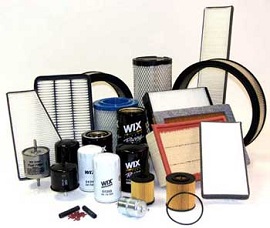
Your automobile is equipped with several types of filters. Some are designed for liquids such as engine oil, transmission fluid, power steering fluid, or fuel. Others are designed to remove impurities from the air under the hood or within the cabin.
Although each filter is created to perform in a specific way, the purpose of every filter is to prevent dirt, debris, or other foreign objects from entering places they don’t belong.
Your car has four to five main filters that often require periodic replacements to properly maintain the vehicle’s operation. To understand the importance of these filters and the basics of replacing them, follow the guide below.
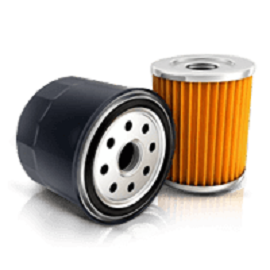
- Engine Oil Filter —The job of the engine oil filter is to catch impurities or debris that forms in your engine oil. Your engine is composed of many metal pieces rotating against each other and causing friction. Though engine oil protects these components from excess damage by keeping them lubricated and cool, the oil can slowly break down over time and cause small metal pieces to break away. The engine oil filter acts a barrier, stopping these particles from re-entering the engine.
Engine oil filters usually come in two styles—the metal canister type and the cartridge type. The metal canister type screws onto the outside of the engine, and the cartridge type is inserted into a housing mounted on the engine. Both filters do the same job but are designed differently.
Oil filters are sold in several types. Inexpensive filters are usually thinner, having less paper material with which to catch impurities. They also have a smaller, anti-siphon valve and weak springs to prevent oil flow-back. These filters are designed for vehicles that require frequent oil changes. However, most cars today are equipped with fully synthetic engine oil that lasts much longer. These vehicles require top quality filters to remain efficient.
Since not all filters are the same, make sure your auto repair shop is using an engine oil filter in your vehicle that fits its need.
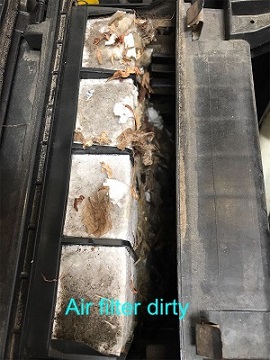
- Engine Air Filter — This filter is usually located in a plastic or metal box under the hood. The purpose of the engine air filter is to catch any dirt and debris before it’s brought into the engine (see picture above).
Fresh air from outside cycles into the vehicle filter via a tube, and another tube caries the clean air into the engine. Every engine needs a specific amount of filtered air to use for fuel for the engine. The ratio is 14.7 parts of air with 1 part of fuel and is sometimes called the Stoichiometric Mixture. As an engine air filter clogs with debris, the amount of air reaching the engine is reduced, causing poor fuel economy and performance.
Just like the engine oil filter, the engine’s air filter needs to be replaced at times. Most service centers will check the condition of your filter with every oil change and recommend replacements as needed.
Many factors such as driving conditions and locations can change the replacement frequency. A standard rule of thumb is that an engine air filter should be replaced very 12-15 thousand miles.
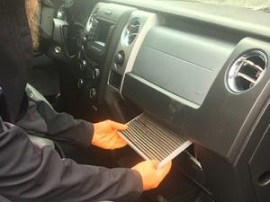
- Cabin Air Filter — Cabin air filters weren’t commonly installed until the early 2000’s, and even then they were not common for the next several years. Now, almost every vehicle is equipped with a replaceable cabin filter. The purpose of the cabin filter is to clean the air passing through your vehicle’s HVAC system. Pollutants, dust, pollen, and exhaust enter your vehicle through the air conditioning unit. The cabin filter is there to filter those pollutants and make sure the air entering your vehicle is clean.
As with other filters, cabin air filters come in different types as well. The highest quality cabin air filters are carbon cabin filters. These filters have been treated with charcoal and heat to give them specific odor-control properties.
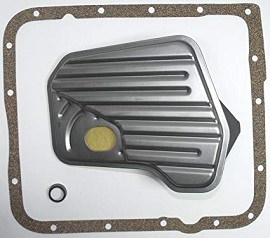
- Automatic Transmission Oil Filter — The transmission filter does basically the same job as an engine oil filter. Its purpose is to filter oil in order to catch any debris circulating within the transmission. The transmission filter is usually located at the bottom side of the transmission just above its oil pan and connected to a pump. Some transmissions have replaceable filters while others have a permanent filter that can only be changed with an overhaul. However, even a permanent filter may have a screen that can be cleaned.
A transmission is made of many small metal and brass components. These components are likely to shred and cause tiny debris to circulate inside the unit. Manufactures have placed a small magnet in the bottom of the oil pan to attract these lose particles.
In order to replace the transmission oil filter, remove the oil pan first. You will need a replacement pan gasket (see picture) to prevent leaks. While replacing the filter, make sure to clean the pan and magnet before placing them back where they belong.
Check your vehicle’s transmission as often as your manufacturer recommendations. As always, driving conditions and physical wear determine how frequently you should replace your oil filter.
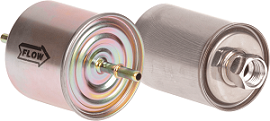
- Fuel Filter—The fuel filter is the least common filter. It functions as any other filter, catching impurities and debris that can build up in the fuel tank. These filters are located along the vehicle’s frame or within the engine compartment and are more likely to clog due to unqualified fuel.
Today’s regulations have greatly improved the cleanliness of the fuel being sold today. Most manufacturers of today’s vehicles have placed their fuel filters inside the vehicle’s fuel tank and in part of the fuel pump’s assembly. The filter is non-serviceable unless the pump needs to be replaced; however, if you have an older vehicle, check with your service provider to see if your vehicle has a replaceable filter and whether it needs replacing.
We hope the information shared in this blog is helpful to your understanding of car filters and their importance. We know the roads and freeways in Southern California are testing on your vehicle’s filters, and we want you to stay safe.
Happy driving, from your friendly auto service facility Camarillo Car Care Center.